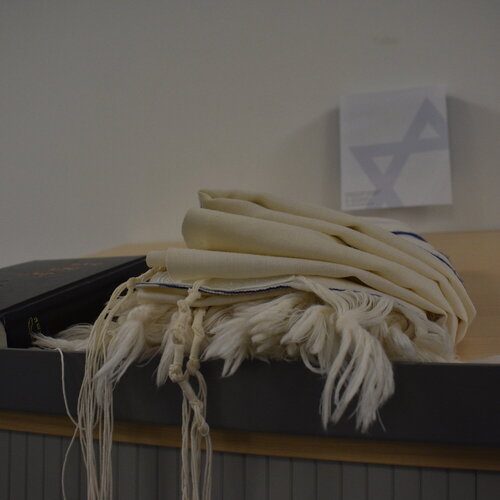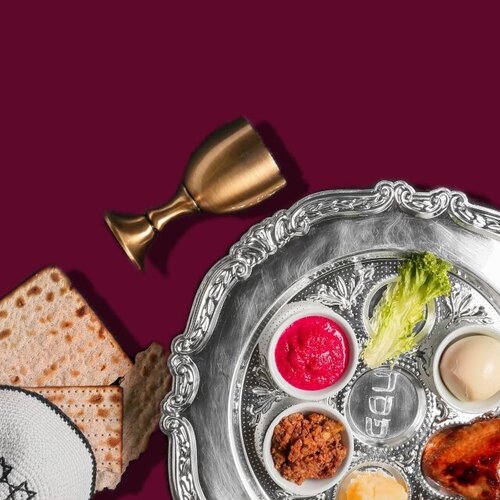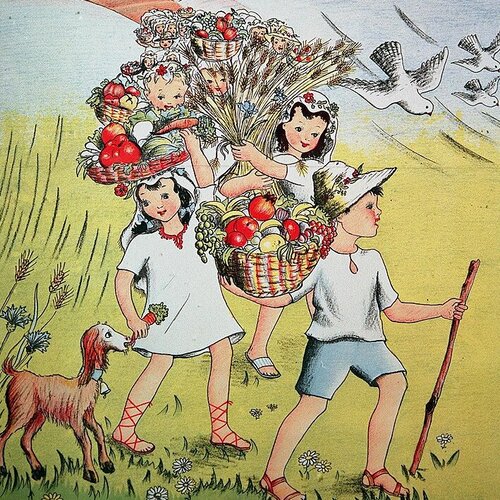Kosher recipes for festive occasions

Shabbat
זכור את-יום השבת לקדשו
Remember the Sabbath day to keep it holy:
Six days you may labor and do all your work.But the seventh day is a holiday to the Lord your God; you shall not do any work there, you and your son and your daughter, your manservant and your maidservant and your livestock, and the stranger who sojourns within your gates. For in six days the Lord made the heavens and the earth, the sea and all that is in them, and rested on the seventh day; therefore the Lord blessed and sanctified the Sabbath day.
exodus 20, 8-11 (translation by Simon Bernfeld)
The Shabbat marks the end of Creation and the beginning of the time of the week that is customary throughout the world today. As part of the Ten Commandments, it continues to shape the rhythm of life in all Jewish communities to this day. To sanctify the day, the housewife begins with the blessing of light on Friday evening, followed by the blessing over the wine and bread said by the man. He also ends it with a lighting ceremony on Saturday evening, which separates the day of rest from the working day or possibly a subsequent feast day.

Purim
The festival of Purim - its food traditions and recipes
The biblical book of Esther tells how Esther, the Jewish wife of the Persian king Ahazver, saved her people by thwarting the plan of the vizier Haman to kill all the Jews in the Persian kingdom with the support of her uncle and adoptive father Mordechai. After Haman, his sons and his followers were eliminated, the new vizier Mordechai decreed that the day, which was actually intended for the extermination of the Jews, should in future be kept as a joyous festival in which everyone, including the poor, should take part. The festival of Purim commemorates this event to this day by celebrating Queen Esther with the reading of the Book of Esther, a festive meal and gifts for friends and the needy.

Passover
The festival of Passover commemorates the Exodus from Egypt, which is recorded in the Bible in the 2nd Book of Moses. Moses and Aaron demanded the liberation of the Israelites from Egyptian bondage, but Pharaoh refused. As a result, the Egyptians were sent ten plagues, which ended with the killing of every firstborn. The Israelites were spared from the killing because they had marked the doorposts of their houses with lamb's blood, as they had been commanded to do. At the same time, they prepared for the Exodus by having one last meal with the meat of the slaughtered lambs before they hurriedly set off.

Shavuot
Shavuot (Hebrew for Feast of Weeks, because it takes place seven weeks after Passover) is the perfect festival for the Heidelberg School of Jewish Studies, as its focus is traditionally on learning. A special learning night (Tikkun Leil Shavuot) is held on Shavuot to commemorate the Sinai law, which corresponds exactly to the university's motto "And meditate on it by day and by night" (Jos. 1:8). In addition, the festive menu is mainly dairy-vegetarian, which also fits in well with the university's canteen.

Rosh HaShanah - Simchat Torah
Recipes for the 2nd festival period
- Rosh HaShanah begins on the eve of 1 Tishri and lasts two days
- Yom Kippur (Day of Atonement) begins on the eve of 10 Tishri and lasts a whole day
- Sukkot (Feast of Tabernacles) begins on the eve of 15 Tishri/ and lasts until 21 Tishri/ (Hoshana Rabbah - day of the Hakafot/ processions)
- Shmini Atzeret (Final Feast) and (Feast of the Joy of the Law) begin on the eve of 22 Tishri and last until the evening of 23 Tishri

Hanukkah - the festival of lights
Recipes for the Hanukkah festival
Festival of lights to commemorate the rededication of the Second Temple in Jerusalem in 164 BCE / year 3597 of the Jewish calendar. It begins on the 25th day of the month of Kislev. The central ritual object is an eight-flame candlestick, which is lit with a ninth separate, so-called "servant light" at the beginning of each evening during the eight days of the festival. Its light commemorates the eight-day battles of the rebellious Jewish Maccabees against the Seleucid-Hellenistic Greeks under Antiochus IV for the Jerusalem Temple. Legend has it that during these battles, the temple candelabrum, the menorah, miraculously burned with the daily ration of a single jar of kosher oil, which dated back to the time of the first biblical temple and bore the seal of Solomon, or the High Priest. After the successful recapture and rededication of the Temple in Jerusalem, the menorah became a symbol of the state's rebirth.
